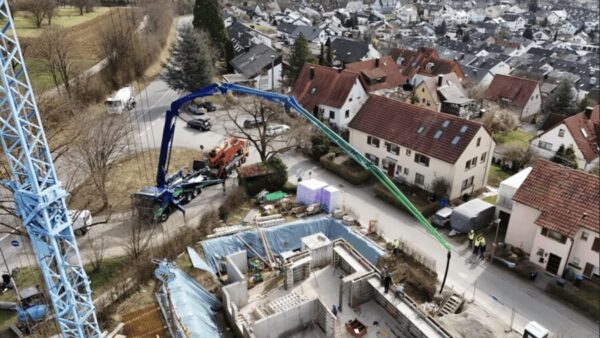GE has announced plans to build a prototype of the world’s largest wind turbine on the outskirts of Rotterdam.
The Haliade-X turbine has a rotor that measures 220m in diameter, twice the length of a football field, and stretches 260m from base to blade tips, nearly three times the height of the Statue of Liberty.
Each turbine will be able to generate 12MW, enough to supply 16,000 European homes, and 2.5MW more than MHI Vestas’ V164-9, which generates 9.5MW from a site in the Irish Sea.
GE engineers calculate that just one of the machines located in the North Sea will be able produce 67GWh a year, which it says is 45% more than the most powerful turbine on the market today.
The size of the turbine allows engineers to capture more of the wind’s energy. The Haliade-X has a “capacity factor” of 63% – meaning that it is able to capture of 63% of the energy it would have produced if the wind had been blowing all year. GE says this is between five and seven percentage points more than the competition.
Vincent Schellings, who leads the development team, commented: “Basically, every point of capacity factor is worth $7m per 100MW for our customers. That’s a nice upside.”
Although the Haliade-X is intended as an offshore turbine, GE Renewable Energy and its partner Future Wind will build the prototype on land to make it accessible over its five-year testing period.
A factory has been built in Cherbourg, Normandy, to create the 107m turbine blades, and work on the prototype will begin this summer with a view to gaining regulatory approval in 2021.
The prototype is part of a $400m investment in the development of the Haliade-X that GE Renewable Energy announced in March 2018.
Image: GE’s spec sheet for the Haliade-X (GE Renewable Energy)
Further reading:
Comments
Comments are closed.











“Highly Questionable at Best”
The entire idea of centralized production is drastically at odds (spitting in the face of) with the fundamental principles of wind energy as a point of use technology. The idea of spending Billions of dollars to produce a device only theoretically capable of 12MW is technically unfeasible, theoretically unfounded and wildly backwards. In fact there is no need for any new wind technology, save for materials research and motor generator efficiency.
General Electric already threw away the best design ever tested. Years ago now, GE bough Honeywell Electric, and later sold it to Toshiba in Japan. On the surface the deal centered around Honeywell’s emerging smart meter utility metering devices recently mandated by many municipalities. The deal however basically killed the WT-6500 produced by Honeywell’s WindTronics division. Despite Toshiba also having a Nuclear Electronics division, they have not announced any intention to revitalize turbine production with focus on fluid energy exchange systems or otherwise.
Despite all of this I will numerically prove that an array of small turbines alone can outpower a single high output turbine, and for less cost. Priced at $4K each the WT-6500 produces roughly 4KW. In fact, only 3000 of these pulling 4KW each at $4K each give us a total output of 12MW for only $12M USD. The difference in production is negliable, while the material cost is incomparable: $12M vs $400Million USD, not counting installation costs, which could exceed the development cost. By their own numbers GE admits that this is over 500% more expensive to install compared to using existing Honeywell WT-6500 units, which already exist.
The conclusion here is that no amount of research can be done to make large units comparably efficient to small units. The waste of resources devoted simply to researching this clearly wasteful project is inconcievable. Jn essence this project will undo the work of mainstream wind engineers all over the world, while simultaneously drawing ridicule for the industry as a whole, when the project ultimately fails to produce the motor itself needed to produce these fantasy claims. I would gamble on Disney Stock before I ever considered buying GE stock ever again at this point…